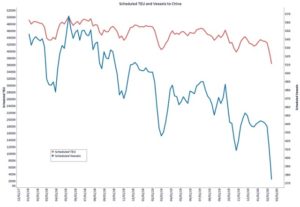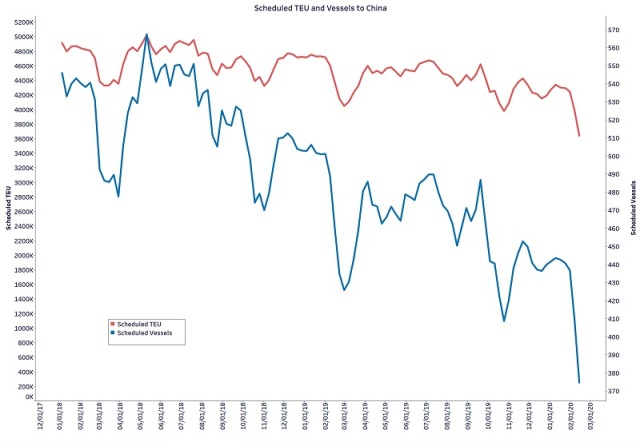 The coronavirus outbreak is already having a sizeable impact on the operational behavior of container vessels even this early, according to a new report from the United Nations Conference on Trade and Development (UNCTAD).
The coronavirus outbreak is already having a sizeable impact on the operational behavior of container vessels even this early, according to a new report from the United Nations Conference on Trade and Development (UNCTAD).
Container ship visits to Chinese ports, measured both in number of vessels scheduled to call and their cumulative capacity in twenty-foot-equivalent units (TEU) plunged in late January and early February, the report said, based on real-time shipping data of vessel positions and the cargoes aboard these ships.
Moreover, the significant drop in ship visits came even as missed port calls (i.e. scheduled vessel calls that do not occur) have risen sharply to levels usually seen in late February and March when ships reduce capacity in the weeks following the two-week Lunar New Year vacation in China.
The traffic slowdown, with both fewer scheduled calls and more cancelled ones, is occurring much earlier this year even with the reduced air cargo capacity from the cancelled flights by many airlines that is forcing manufacturers to switch to waterborne transportation even for higher-value and more time-sensitive cargo.
More significantly, the slowdown in port calls is occurring worldwide, not just in China, said the report. Shipping companies have been reducing scheduled capacity since about August of 2018 on most trade lanes as trade wars slow global demand for cargo capacity.
“In the second half of January and early February, this drop accelerated significantly. The centrality of China to the movement of goods around the world explains this: if Chinese ports are not loading or discharging containers, there is no reason to stop at the port where the shipment is supposed to go to or come from. The move towards bigger container ships is another important factor at play: a missed port call now has a more profound impact on available capacity,” said UNCTAD.
The outbreak and spread of the coronavirus, across China and now the world, is influencing decisions by manufacturers, importers and exporters.
“Immediate actions so far show an un-coordinated and pointillist approach,” said the report. “Container ship operators are slashing capacity in reaction to the prolonged shutdown of manufacturing plants.”
The outlook for economic and trade activity—particularly in East Asia—is one of weakness, it added. The epidemic has yet to run its course, but even after the spread subsides and China starts to return to normal business activity, it will take a long time to unwind the stresses inflicted on the world’s trading system.
“A return to medium and long-term trends in shipping and trade is unlikely before the second half or even fourth quarter of 2020,” said UNCTAD.
Image courtesy of UNCTAD





